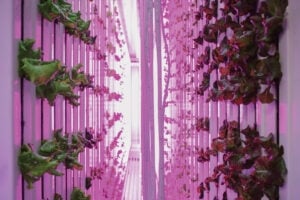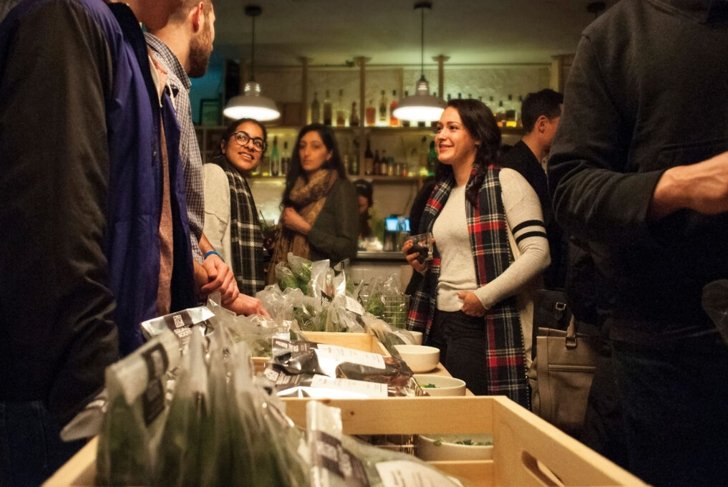
Driven by a love of local food, Square Roots is cultivating the future of urban farming.
In the parking lot of an old factory in Brooklyn, a cluster of industrial shipping containers has become the unlikely headquarters of a locavore revolution.
Inside each container, vertical rows of leafy greens and herbs flourish under the glow of photosynthetic fuchsia lighting. Water for the hydroponic growing system comes courtesy of a nearby fire hydrant, and the farmers nurturing these non-GMO, pesticide-free crops are hip, young New Yorkers with a passion for fostering community through locally grown food.
 Photo credit: Freight Farms
Photo credit: Freight Farms Photo credit: Erik Groszyk Tatson
Photo credit: Erik Groszyk Tatson
Growing a foodie community
The shipping container model has allowed Square Roots to put the farm and the farmers in the closest possible proximity to city dwellers. Through the Farm to Local program, New York denizens can have their farmer hand-deliver freshly harvested greens direct to their work desks each week. Monthly tours of Square Roots’s farming “campus” draw hundreds of visitors, creating a community of engaged urban foodies.
It’s a chance for people to “come see the farms, meet the farmers, taste the food and talk with other people about local food systems,” says Peggs.
Restoring faith in farmers
Welcome to Square Roots, an urban farming accelerator hatched last year by CEO Tobias Peggs and business partner Kimbal Musk (the brother of Tesla CEO Elon Musk). United by an ardent interest in tech and food, the pair’s aim is to find ways to grow real, local food in dense urban areas where space for farms is virtually nonexistent—and restore urbanites’ faith in their farmers in the process.
“People have lost trust in industrial food,” says Peggs. His prior work experience introduced him to the internal workings of the industrial food system, which ships processed food—often high in calories and low in nutrients—across thousands of miles over multiple months. This has led to disconnection between farmer and consumer.
With Square Roots, Peggs wants to disrupt that alienating process. “If you know your farmer, if you have a direct relationship with that farmer and if you see how that farmer is growing food that was harvested a day ago, not a month ago, that’s food you can trust,” he says.
The farms are also a training ground for a new generation of sustainable-food foot soldiers. Each shipping container is helmed by one of 10 farmer-entrepreneurs handpicked by Peggs and Musk to grow crops of their choosing for one year under the guidance of a wide network of mentors. Over time, as each cohort of farmers graduates and moves onto their own enterprises, Peggs hopes they will ultimately “take down the industrial food system for good,” he says.
Supporting a sustainable future
Currently, they’re growing 78 different varieties of delicious greens, from chard to basil to kale. Within the next two years, Peggs anticipates that the farms will be ready to accommodate blooming crops like tomatoes and strawberries, a development he’s really excited about. “Imagine being able to get a fresh, local strawberry in New York … in February!”
That feat will be possible because the indoor farms aren’t affected by climate constraints. As Peggs explains, “You’re essentially able to grow food from all over the world because you can control light, temperature, humidity and nutrient mix.”
It may be the ultimate sustainable farming model. “Now, instead of shipping food from one part of the world to the other,” says Peggs, “you’re just shipping data.”
And given that each 320 sq ft shipping container yields the equivalent of a two-acre outdoor farm while using 80 percent less water, the drain on natural resources is significantly reduced. Plus, exploiting existing infrastructure—like the subway for delivery—guarantees that “the footprint that we’re leaving on the planet is as minimal as possible,” he says.
That kind of sustainability will become increasingly essential as the world’s population booms—especially in urban centers. “By 2050,” notes Peggs, there will be “9 billion people on the planet, and 70 percent of them will live in cities.”
“The hope is that we’ll have a Square Roots campus in literally every city in America,” says Peggs. “And what that means is that everyone can know their farmer.”
 Photo credit: Square Roots
Photo credit: Square Roots
A food entrepreneur spills all
Kimbal Musk is many things. In addition to being the co-founder of Square Roots, he’s the co-founder of The Kitchen, a family of farm-to-table restaurants that aim to make real food accessible to everyone. Plus, he serves on the board of directors for mega brands like Chipotle and Tesla.
How does he do it? alive’s Editor-in-Chief Brendan Brazier sat down with the entrepreneur to find out some of the secrets to his success.
Q: Brendan Brazier: Do you do any mental training?
A:Kimbal Musk: Meditation has been a powerful tool for me to calm my mind and focus on what’s important.
Q: Do you have a workout routine?
A: I love to walk and hike. While [exercise] is good for my physical health, I mostly do it for my mental health and peace.
Q: What do you see as the biggest opportunity in the food industry?
A: It’s a $5 trillion industry, so the opportunities are endless. I’m focused on real food restaurants and vertical farming, which are a huge part of our future.
Q: What’s the best business advice you’ve ever been given?
A: I have had the honor of being around so many great business leaders. Probably the best advice was to be open to learning from everyone. Be curious. Learn from the young and the old. From the experienced and the inexperienced. No one has the right answer, and you never know who you’ll get insight from next.
Q: When you come up against challenges in business, what advice do you rely on?
A: Don’t panic. Everything will be fine in the end. If it’s not fine, it’s not the end.
Q: Any hobbies?
A: I play guitar and sing Johnny Cash songs.










